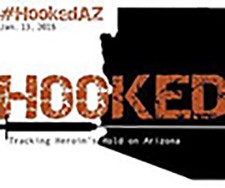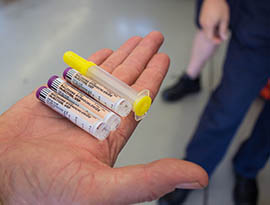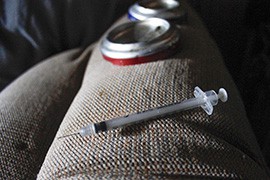Cronkite News has moved to a new home at cronkitenews.azpbs.org. Use this site to search archives from 2011 to May 2015. You can search the new site for current stories.
White House budget includes $133 million to fight heroin abuse
WASHINGTON – The White House said Thursday that it will allocate $133 million toward the nation’s heroin epidemic, funding prevention strategies, medication-assisted treatment programs and efforts to reduce drug crimes.
The money, included in President Barack Obama’s fiscal 2016 budget proposal, is part of an administration policy of being “laser-focused on reducing opioid abuse and its consequences,” said Michael Botticelli, acting director of the Office of National Drug Control Policy.
The proposal comes as heroin and prescription drug abuse is surging across the country.
Arizona has seen a steady rise in heroin overdoses, from 277 in 2009 to 561 in 2013, according to a Cronkite News analysis of public records from the Arizona Hospital Discharge Data Set, gathered by the Bureau of Public Health Statistics in the Arizona Department of Health Services.
“Almost every day I hear from someone who has lost a loved one to overdose,” Botticelli said during a White House conference call Thursday to announce the funding proposal. “It is heartbreaking and it’s hard to quantify the suffering attached to this epidemic.”
Under the proposal, the Centers for Disease Control and Prevention would get $48 million to fund state grants aimed at improving prescription drug monitoring programs.
Ileana Arias, principal deputy director of the CDC, said that prescription opioid drugs have legitimate important uses that shield many Americans from persistent pain. But these drugs have created many problems as well.
“Every year the misuse and abuse of prescription drugs impacts the lives of millions of Americans across the country,” Arias said in the call. “It’s a complex and critical public health challenge requiring an aggressive and multi-program response.”
Theresa Londono, project manager at DrugFreeAZKids.org, said prescription drugs are a prime concern for her organization.
“By the time they’re seniors in high school nearly one in five (Arizona residents) have at some point in their life abused a prescription drug,” Londono said.
The president’s budget would also fund grants in up to 10 states for programs “to reduce opioid deaths, explicitly to allow states to purchase naloxone, the medication that reverse overdoses … and equip and train first responders in high-risk communities,” said Pamela Hyde, administrator of the Substance Abuse and Mental Health Services Administration.
SAMHSA would also get money to expand medication-assisted treatment programs.
Additionally, $1.8 million would go toward law enforcement and intelligence in order to reduce transnational drug crime – something David Hickton, U.S. Attorney for the Western District of Pennsylvania, said is a necessary component to fighting the heroin epidemic.
“We need to be as vigilant in attacking the demand side of the problem as we are in attacking the supply side of the problem by dismantling illegal drug organizations,” Hickton said during Thursday’s call.









